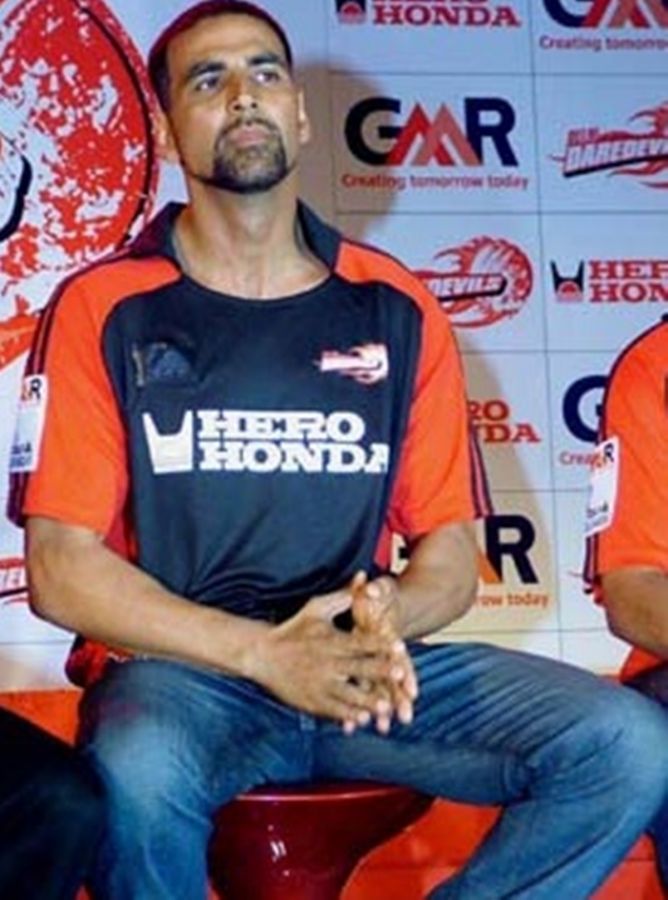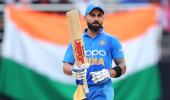
He could have easily played hardball with all the aces up his sleeve but Bollywood star Akshay Kumar instead terminated his lucrative contract with Delhi Daredevils (now Capitals) in 2009 after the IPL franchise needed to cut down on losses, according to a new book.
The incident has been mentioned in detail in veteran cricket administrator Amrit Mathur's autobiography Pitchside: My Life in Indian Cricket published by Westland Sport.
"Akshay signed a three-year deal with Delhi Daredevils to shoot promotional films, attend meet and greet events and make appearances at corporate events..." Mathur wrote in his book.
"Apart from Kotla act (he performed daring stunts), nothing much happened because DD didn't know how to leverage him. At the end of the season, during elaborate post-mortem held against backdrop of serious financial losses, DD decided to cancel or renegotiate the contract."
Mathur went on to write how it became an arduous job.
"Akshay's contract provided no exit; on the contrary, it gave him solid guarantees for a period of three years. DD's lawyers approached Akshay's staff, wanting to revisit the contract, but they made no headway.
"The (legally correct) response from his side was that contract didn't factor in early termination and it has run its course with full monetary compensation," Mathur recalled in his book.
"Seen from perspective of DD, Akshay's multi-crore contract could be equated to a self goal or hit-wicket dismissal. Considering the disastrous financial results and need for austerity, the star had become an avoidable expense. Knowing there was no legal lifeline available, DD appealed to Akshay for mercy."
Mathur claimed in his book that he was the designated trouble-shooter for DD and met the star in his vanity van during the shooting of Chandni Chowk to China.
"After the shot, we returned to his vanity van and I, very hesitantly, explained the reason for my visit and outlined DD's financial troubles.
"No problem ji, he said in a sympathetic manner. If it's not working, let's close it. I thought I hadn't heard him right."
"Seeing my confused look, he clarified slowly, 'Isko khatam kar dete hain (let us end this)'. When I mumbled about the stringent contract clauses, he reassured me, 'Koi baat nahin, main lawyer ko bol dunga (No problem, I will tell the lawyer)'."
The actor's magnanimity left him pleasantly surprised.
Mathur goes on to write, "Even after so many years I am surprised that Akshay waived off such a large amount of money. Just like that -- snap decision when he could have easily thrown the contract at us."
The book takes a sneak peek into Indian cricket and Mathur's association with the establishment for three and half decades helped the readers get a lot of first-hand anecdotes.
If anyone is looking for controversies, this is not the right book. While he narrates some feel-good anecdotes during his time as administrative and media manager, a lot of those are already known to cricket nerds.
An eminently readable book, some of the wrong facts are however a bit of a letdown.
In one place he writes (on Page 29) that Ravi Shastri retired from all forms of cricket after the South Africa tour of 1992-93. That's the first wrong fact.
While Shastri never played for India after that tour but he captained Mumbai for the entire 1993-94 season, and they won the final in March, 1994 beating Bengal.
The even bigger glaring error is there on Page 32 and 33 where he mentions the famous Mankading incident involving Kapil Dev and Peter Kirsten, and subsequently, Kepler Wessels hitting the Indian legend on shin on the pretext of turning for the second run.
Mathur wrote that the incident happened during a Test match as at one place he refers that Kapil told the team during tea time but it actually took place during an ODI game prior to the Tests.
The third one was on Page 187 where he describes Irfan Pathan as a Test debutant ahead of the Lahore Test of Pakistan series in 2004.
However, Pathan had made his Test debut in Adelaide in December 2003, during the team's previous series.











